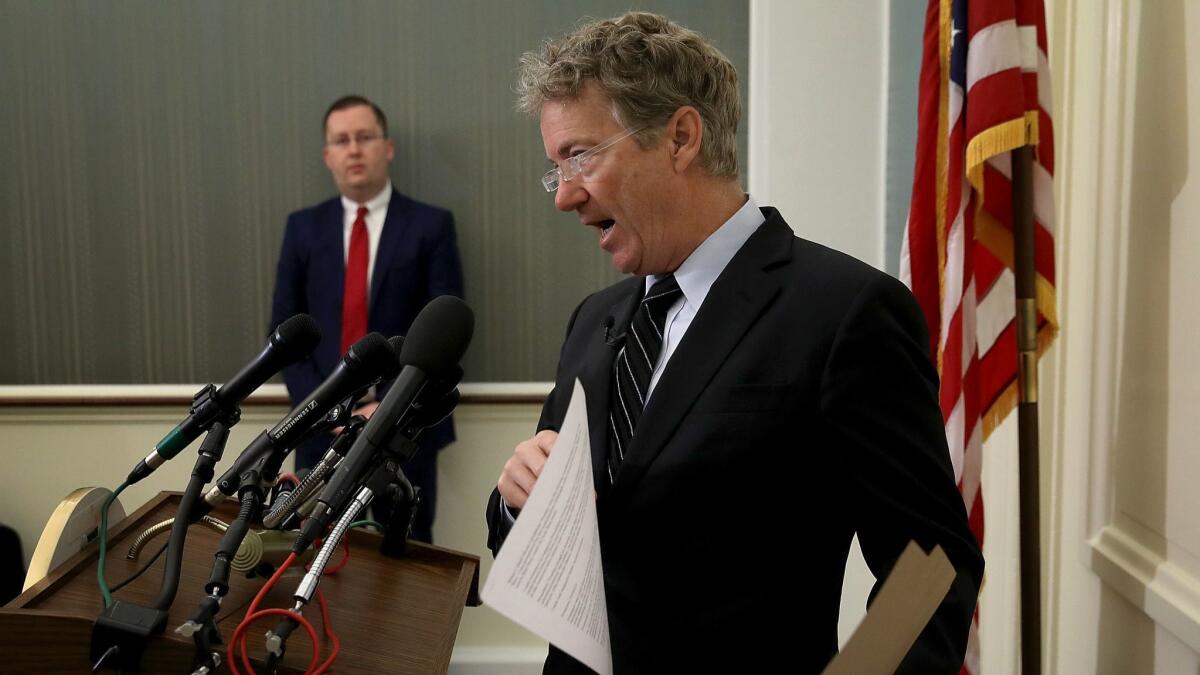John McCain was tortured as a POW in Vietnam. Will he help sink CIA nominee implicated in torture program?
Activists seeking to derail President Trump’s nomination of Gina Haspel to lead the CIA are looking to Sen. John McCain to cast the deciding vote against her — assuming he is well enough to return to Washington.
The 81-year-old Republican was diagnosed with brain cancer in July and last cast a vote in the Senate on early December before he returned home to Arizona for treatment. He underwent surgery in Phoenix for an intestinal infection on April 15.
Haspel’s critics are counting on McCain to speak out against her nomination, even if he can’t cast a vote on the Senate floor, cementing his legacy as the country’s most prominent critic of torture as he faces the twilight of his career.
“Sen. McCain is essential,” said Matt Hawthorne, policy director for the National Religious Campaign Against Torture. “He has more moral leadership on the issue of torture than anyone.”
McCain was tortured as a prisoner of war during the Vietnam War, and he helped lead denunciations of the CIA’s harsh interrogations of terrorism suspects in a secret network of overseas prisons after the 2001 Al Qaeda attacks on New York and the Pentagon.
Haspel ran one of the so-called black sites, in Thailand in 2002, and in 2005 she helped authorize the shredding of videotapes made of waterboarding and other abusive treatment of detainees at the facility.
Haspel has won wide respect in the intelligence community for her other work at the CIA, serving overseas and undercover for most of her 33 years in the agency. She is now deputy director.
The Obama administration decided not to prosecute anyone for the CIA’s harsh interrogation program, and Haspel’s supporters note that at least some members of Congress gave their blessings to it.
“It is truly the height of political hypocrisy for Congress to raise objections to someone who participated in a program that they were briefed on and they approved,” said Hank Crumpton, a former CIA officer.

More than 50 former intelligence officials and lawmakers sent a letter supporting Haspel to the leaders of the Senate Intelligence Committee. The committee has scheduled Haspel’s confirmation hearing for May 9.
“She is a true intelligence professional who brings care, integrity and a commitment to the rule of law to her work every day,” the letter said. Among the signatories were former CIA Directors John Brennan, Leon E. Panetta, Michael Hayden and George Tenet, as well as Michael Morell, who served twice as acting director.
McCain, who is serving his sixth term in the Senate, has expressed skepticism of Haspel but hasn’t said whether he will oppose her nomination. His office says he remains engaged in his work in the Senate, where he heads the Armed Services Committee, during his illness.
A Navy pilot in the Vietnam War, McCain was shot down over Hanoi in 1967 and imprisoned for 5½ years. As the son of the Navy admiral who commanded U.S. forces in the Pacific, McCain was offered early release, but he refused to jump the line ahead of POWs who were captured years earlier. He was beaten and held in solitary confinement, exacerbating injuries he suffered when he ejected from his fighter jet.
McCain’s relations with Trump have been strained since 2015 when Trump — who received multiple draft deferments during the war — appeared to mock McCain’s sacrifice.
“He’s not a war hero,” Trump said at a Republican Party candidates’ forum in Iowa. “He’s a war hero because he was captured. I like people who weren’t captured.”
Last July, McCain’s cast the decisive and dramatic no vote that blocked Republican attempts to repeal parts of Obamacare, which Trump had called a priority. McCain might relish a chance to torpedo Trump’s CIA nominee as well.
Haspel was working at the CIA’s Counterterrorism Center in 2001 when the agency approved what it called “enhanced interrogation techniques” for terrorism suspects it had captured overseas.
During the next five years, some were subjected to mock drowning, forced to go without sleep, slammed against walls, given rectal feeding and confined in coffin-size boxes.
Read our deep look at Gina Haspel’s career as an undercover CIA operative »
Haspel reportedly ran the CIA prison in Thailand when Abd al Rahim al Nashiri was waterboarded. The Saudi was accused of helping to mastermind the suicide bombing of the Cole, a U.S. warship at anchor in Yemen, that killed 17 American sailors in 2000.
Nashiri ultimately was taken to the U.S. military prison at Guantanamo Bay, Cuba. His long-delayed trial before a military commission there finally was set to start this year but was suspended again last month after his civilian lawyers quit over fears the government had been spying on them.
According to his military lawyer, Lt. Alaric Piette, a Boston University medical professor who examined Nashiri said “he’s the most traumatized torture victim she’s ever seen, and she’s treated and observed hundreds, including those who’ve been tortured by brutal regimes and warlords.”
Piette, a former Navy SEAL, described Nashiri’s treatment as “disgusting.” He added, “That was a time when we needed professionalism and leadership, and we got torture instead.”
Haspel’s role in the episode remains classified, frustrating advocacy groups concerned about the nomination. It’s not publicly known whether she ordered waterboarding and other harsh tactics, or opposed them.
“It’s not an easy process. She’s been undercover for so long,” said Raha Wala, a lawyer at Human Rights First.
Memoirs by former CIA officials have described Haspel’s role in the CIA shredding of the interrogation videos. Haspel advocated destroying the tapes and drafted the cable directing CIA officers in Thailand to do so. Her boss, Jose Rodriguez, then the director of clandestine operations, gave the order.
The CIA has promised to disclose more about Haspel’s background for her confirmation hearing.
“Through the confirmation process, the American public will get to know Ms. Haspel for the first time,” said Jonathan Liu, an agency spokesman. “When they do, we are confident America will be proud to have her as the next CIA director.”
Even before the full scope of the CIA interrogation program was revealed, McCain was a regular critic.
“We can’t torture or treat inhumanely suspected terrorists we have captured,” McCain said during his failed presidential campaign in 2008, when he was the Republican nominee.
Last November, McCain nearly killed Trump’s nomination of Stephen Bradbury for general counsel of the Transportation Department. During the Bush administration, Bradbury had helped prepare secret Justice Department memos approving the use of waterboarding and other harsh interrogation tactics.
Sen. Joe Manchin III (D-W.Va.) planned to vote for Bradbury but didn’t after McCain phoned him. Manchin later told Politico that he opposed Bradbury “because of John’s service to our country, my respect and admiration for John.”
In the end, Bradbury was confirmed by a 50-47 vote. But the Senate math isn’t as favorable for Haspel.
The Republican majority has slipped to 51 to 49 and Sen. Rand Paul (R-Ky.), another vocal critic of torture, already has pledged to vote no. If he is the only Republican defection, Haspel can squeak through.
But if McCain opposes her as well, her nomination could be doomed because his stance would increase chances that all Democrats will oppose her. Senate Minority Leader Charles E. Schumer (D-N.Y.) has not directed his caucus to vote one way or another.
McCain’s office declined to answer questions involving his thoughts on Haspel’s nomination.
The senator has receded from public view during his cancer treatment. His latest memoir, “The Restless Wave,” is scheduled for release on May 22, but he has skipped recent events in his honor in Arizona.
McCain isn’t the only senator to watch. The other is Sen. Dianne Feinstein (D-Calif.), who spearheaded a scathing 6,000-page report on abuses in the CIA interrogation program when she headed the Senate Intelligence Committee. A heavily redacted version was released to the public in December 2014.
“If both of them weigh in against Gina Haspel, I think it’s over” for the nomination, said Christopher Anders of the American Civil Liberties Union.
Follow the latest news of the Trump administration on Essential Washington »
McCain and Feinstein worked together in 2015 to pass legislation banning torture, reinforcing an earlier executive order from President Obama.
Feinstein has not said how she will vote on Haspel’s nomination.
“I’m very wary of” confirming as CIA director “someone so heavily involved in the torture program,” she said in a recent statement.
Trump nominated Haspel to replace Mike Pompeo, who has headed the CIA since early last year and made a secret trip to North Korea over Easter weekend this year to help arrange a proposed summit between Trump and that country’s ruler, Kim Jong Un. Trump has nominated Pompeo to be secretary of State.
To read this article in Spanish, click here
Twitter: @chrismegerian
UPDATES:
7:09 a.m.: This article was updated with the date of the Senate confirmation hearing.
This article was originally posted at 3 a.m.
More to Read
Get the L.A. Times Politics newsletter
Deeply reported insights into legislation, politics and policy from Sacramento, Washington and beyond. In your inbox three times per week.
You may occasionally receive promotional content from the Los Angeles Times.







